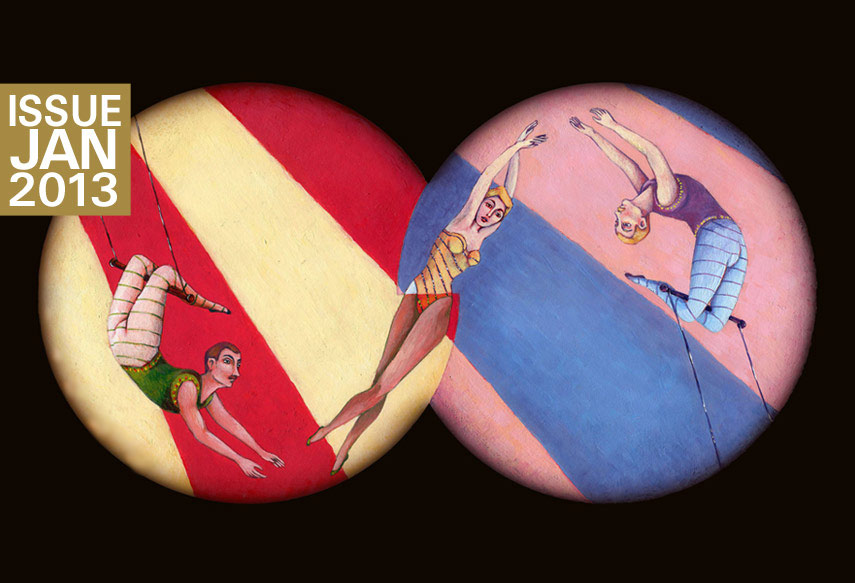- Featuring
- Toh Enjoe
- Aleš Debeljak
- Edmund White
- Amélie Nothomb Howard Goldblatt
- Johanna Drucker and Simon Lewty
Well, hello there, 2013! We barely noticed you starting what with all the exciting developments here at Asymptote. Not only are we turning two, we're also celebrating with eight events in seven countries across the globe and launching our first ever online fundraiser! Now, you may ask, has this had any effect on the new issue? Only that it's even more chock-full of awesome! Still, some kidding aside, we really are proud to give you this, our ninth issue.
For one, we got to talk to our favorite Francophile, Edmund White, about why Proust is "a more profound psychologist than Freud". We also have an excerpt from the new novel by Amélie Nothomb, the Belgian phenom behind Fear and Trembling; Life Form is about yet another cultural clash—this time with an American soldier in Iraq. But perhaps we are proudest of bringing you the first ever English translation from Toh EnJoe's 2012 Akutagawa Prize-winning novel, Harlequin's Butterflies. In the fascinating interview Toh also granted us, the Physics PhD elaborates on his "un-local novels", and how we must cherish the ability to enjoy strange things.
Our poetry section begins with the blue of the sky in Dagmara Kraus's gloomerang and ends with the yellow of a mountain in Nicolas Pesquès' The North Face of Mount Juliau, Six. Inbetween, we have work spanning diverse eras and geographies, yet the unanimous concern for place—internal, external, historical, political, psychological—recurs with force. In Shrikant Verma's Magadh poems, place is marked by the vagaries of death; Aleš Debeljak's Smugglers is rooted in the Balkans; and Chuya Nakahara's Goat Songs are embedded in the elements. Many of the nine poets included in this issue consider just what place is and how we imagine it—how we encode it in language.
For the first time, our table of contents now has taster lines by all poets, as well as teaser images for the visual section. All the more suitable, as this issue sees the auspicious debut of our new Visual Editor, artist Simon Morley, who has collected an intriguing group of creators, all of whom work with text or language in crucial and intriguing ways. Simon Lewty, for instance, delves into tachygraphy (that's shorthand, FYI) to explore the act of writing and the nature of learning a language. The wonderful book artist Johanna Drucker, on the other hand, makes the intriguing claim that she too is a translator, albeit a graphic one. Performing her own graphic somersaults on the fiction, creative nonfiction and drama in our pages is our guest artist from Italy, Michela Caputo, whose playful, flowing style puts the icing on the cake of this 2nd anniversary issue.
As usual, there's a ton more, notably a small feature on the relationship between author and translator, with a generously personal essay by Howard Goldblatt on his relationship with Huang Chunming. Reif Larsen, the author of the widely acclaimed T.S. Spivet (translated into umpteen languages), returns to tell us about the crucial skills a translator must possess, not only through the interview he did with his Dutch translator, but also in a Wes Andersonian trailer we will be releasing shortly on our Facebook page and Tumblr. Other highlights include Uljana Wolf and Christian Hawkey's Ilse Aichinger translation, Dylan Suher's defense of Mo Yan, Vasily Grossman's visit to Armenia, and Gérard Mace's imagined (?) Museum of Shadows in Prague.
Before we leave you to discover this splendiferous new issue, we'd like to gently remind you to also check out our events and our fundraising campaign (also accessible from our newly revamped Donate page). And above all to spread the word, as there's so much more in store: after our African Feature in the Apr 2013 issue, our first ever Drama Feature in our July issue (check out the submission guidelines here), for instance, and an international translation competition that esteemed intellectual Eliot Weinberger just agreed to judge 2 days ago! (Details to follow.) Remember, you heard it here first.
—Lee Yew Leong, Editor-in-Chief
Editorial Team for Issue Jan 2013
Editor-in-Chief:
Lee Yew Leong (Taiwan/Singapore)
Managing Editor:
Florian Duijsens (Netherlands/Germany)
Section Editors:
Lee Yew Leong (Taiwan/Singapore)
Aditi Machado (India/USA)
Caridad Svich (USA/UK)
Simon Morley (UK/South Korea)
Contributing Editors:
Howard Goldblatt (USA), Aamer Hussein (Pakistan/UK), Sylvia Lin (Taiwan/USA), Sayuri Okamoto (Japan/Italy),
Sim Yee Chiang (Singapore), Dylan Suher (USA) and Adrian West (USA)
Editor at Large (Pakistan): Mushtaq ur Rasool Bilal
Assistant Editor:
Nicholas Skidmore
Incoming Assistant Editors:
Megan Berkobien (USA) and Leonard Ng (Singapore)
Publicity (Chinese): Lin Kuo-cheng (Taiwan)
Liaison (Barcelona): Julia Sanches and Alejandra Munoz
Liaison (New York): Jacob Severn
Masthead for Issue Jan 2013
Fiction/Nonfiction/Feature/Criticism/
Interview: Lee Yew Leong
Poetry: Aditi Machado
Drama: Caridad Svich
Visual: Simon Morley
Illustrations and Cover: Michela Caputo
Interns: Megan Berkobien, Alejandra Munoz, Leonard Ng, Emma Ramadan, Julia Sanches, Jacob Severn and Jacob Silkstone
Design: Lee Yew Leong and fFurious
Guest Artist Liaison: Sayuri Okamoto
Legal Counsel: Lindy Poh
Asymptote would like to acknowledge the support and/or contributions of: Balkenende Chew & Chia (Advocates & Solicitors), Forrest Gander, Reif Larsen, Tiffany Gannon, Walker Chen, Nat Niu, Choo Lip Sin, Alex Kwek, Wee Shu Ting, Clare Wigfall, Kailin Gregga, Jason Haase, Erin Fortenberry, Solène Chabanais, Raphael Magarik, Alyssa Migliori, Jeffrey Waxman, Kazuto Yamaguchi (Kodansha) and many, many more (please forgive us if we have omitted your name).
Thanks go too to Forrest Gander and Tan Bee Thiam for their generous pledges of donations.




